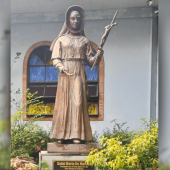How to Host Jesus: Lessons from Saints Martha, Mary, and Lazarus

In the quiet village of Bethany, just outside Jerusalem, lived three siblings whose friendship with Jesus has echoed across centuries. Saints Martha, Mary, and Lazarus were not just hosts to the Son of God in their home; they became living witnesses to the essence of faith, friendship, and hospitality.
Their names are woven into the Gospels of Luke and John as beloved companions of Jesus. Their simple home welcomed with food and shelter, and also hearts open to the sacred. Their lives speak to a ministry of accompaniment a presence that requires not much speaking, but the courage to simply be there, to walk with, and to love.
Martha: Serving with Presence
Of the three, Martha is perhaps the most familiar. She is the host bustling in the kitchen, feet busy with preparation and hands full of care. In Luke 10:41–42, when she complains that Mary is not helping her, Jesus gently reminds her, “Martha, Martha, you are anxious and worried about many things. There is a need for only one thing.”
This is not a dismissal of Martha’s work, it is a re-centering of her purpose. Martha’s service is sacred, but hospitality rooted in love must not be frantic or burdened. It should come from a deep, peaceful love, a presence that offers not just things, but oneself.
In today’s fast-paced world, where productivity often overshadows presence, Martha teaches us that doing is good, but being is essential.
Mary: The Listening Heart
Mary, by contrast, is the image of contemplation. In Luke 10:39, she sits at Jesus’ feet, soaking in His words. Later, in John 12:3, she anoints His feet with costly perfume, a gesture of silent reverence and love.
In a noisy world flooded with digital noise, artificial intelligence, war, corruption, and disinformation, Mary challenges us to be still. Her attentive presence is a form of spiritual activism, a radical act of listening in a culture obsessed with speaking. She teaches us that friendship with Christ is not about performance; it’s about attunement to His presence.
Mary reminds us that faith grows in silence, and that hearing God requires turning down the volume of the world.
Lazarus: Silent Witness to Resurrection
Lazarus, unlike his sisters, never speaks in the Gospels. And yet, his story is one of the most powerful. In John 11:11, Jesus says, “Our friend Lazarus is asleep, but I am going to awaken him.” What follows is one of Christ’s greatest miracles, raising Lazarus from the dead.
Lazarus embodies the quiet power of belief. His friendship with Jesus did not save him from death, but it did call him back to life. In his resurrection, we see God’s timing, His mercy, and His victory over death itself.
In a world weary with suffering and uncertainty, Lazarus shows us that God’s love is never too late. He is a symbol of quiet endurance, reminding us that even in silence, faith lives.
A Spiritual Home for Today
The lives of Martha, Mary, and Lazarus may have unfolded centuries ago, but their relevance remains startlingly fresh. They show us that hospitality is more than opening one’s door; it is about opening one’s life. In their home, Jesus was welcomed, known, loved, and served. In our lives, we are called to do the same.
Their example is deeply countercultural. In a society often marked by isolation, anonymity, and performance, these three saints show us how to create spiritual intimacy, to make room for God and others in real, meaningful ways.
Their feast day on July 29 is an invitation to pause and reflect:
- Am I like Martha, serving with a full heart or merely rushing through the motions?
- Am I like Mary, tuning in to God’s whisper amid the world’s noise?
- Am I like Lazarus, trusting in God’s love even when He seems silent?
Martha, Mary, and Lazarus show us that being a friend today of Christ and others means listening deeply, loving patiently, serving joyfully, and hoping steadfastly.
In following their example, we too can build homes, spiritual homes, where Christ is not only welcomed but encountered.
Radio Veritas Asia (RVA), a media platform of the Catholic Church, aims to share Christ. RVA started in 1969 as a continental Catholic radio station to serve Asian countries in their respective local language, thus earning the tag “the Voice of Asian Christianity.” Responding to the emerging context, RVA embraced media platforms to connect with the global Asian audience via its 21 language websites and various social media platforms.











